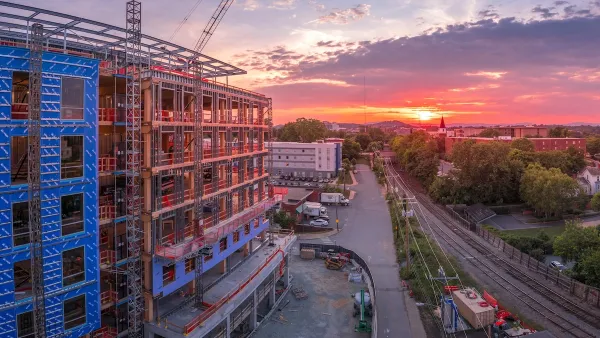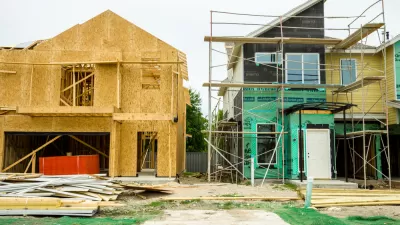Greetings from Manila where I'm attending the Asian Development Bank's Transport Forum 2012. It is an exciting and important event: the types of transport planning investments that the bank supports now can have huge impacts on the nature of future.
Greetings from Manila where I'm attending the Asian Development Bank's Transport Forum 2012. It is an exciting and important event: the types of transport planning investments that the bank supports now can have huge impacts on the nature of future development in the world's fastest growing countries. This is an opportunity to support truly sustainable development.
Development banks have been criticized in the past for favoring automobile-oriented projects such as new urban highways, but their policies are changing to favor alternative modes, including walking, cycling and public transport. It is truly a paradigm shift; a change in the way problems are defined and solutions evaluated. Its exciting to be involved.
For example, yesterday's theme was traffic safety. The ADB gave a presentation which reflected the old traffic safety paradigm: that traffic accidents result from special risks, such as drunk driving and faulty vehicles, which safety programs should target. This approach has some merit but ignores the inherent risk associated with motor vehicle travel, and the potential safety benefits of transportation demand management and smart growth policies. Fortunately the good folks at Embarq gave a great presentation on their research concerning the very large traffic safety benefits from transit oriented development in developing countries. Their transport modeling can actually predict the number of traffic deaths that can be avoided from transit-oriented development, rather than automobile-oriented sprawl, in rapidly expanding Asian cities. Similarly, I also attended workshops on healthy and socially inclusive (i.e., it helps physically and economically disadvantaged people) transport, all of which recognize the importance of non-motorized transport, efficient and affordable public transport, and smart growth development policies.
Of course, the devil is in the details. Policy changes are great, but these concepts must filter down to the day-to-day decisions made by practitioners: planners, engineers and economists. That is my role: I am presenting at professional development workshops in which we discuss exactly how to implement new approaches such as complete streets, transportation demand management and smart growth in developing country conditions.
There is tremendous enthusiasm and creativity among my colleagues in developing countries. It is also truly multi-cultural, people from all over the world, from every race and cultural background, work together in these meetings. It is stimulating, sometimes frustrating and very important. I am honored to be able to contribute.
For More Information
ADB (2009), Changing Course: A New Paradigm for Sustainable Urban Transport, Asian Development Bank.
Paul Barter (2010) Parking Policy in Asian Cities, Asian Development Bank. Also see www.slideshare.net/PaulBarter/barter-for-adb-transport-forum-2010.
Beijing Transport Demand Management aims to identify and evaluate suitable non-technical measures to reducing vehicle traffic and associated pollution emissions.
Daniel Bongardt, Dominik Schmid, Cornie Huizenga and Todd Litman (2011), Sustainable Transport Evaluation: Developing Practical Tools for Evaluation in the Context of the CSD Process, Commission on Sustainable Development, United Nations Department Of Economic And Social Affairs.
Andrea Broaddus, Todd Litman and Gopinath Menon (2009), Training Document On Transportation Demand Management, Sustainable Urban Transport Project.
CSE (2009), Footfalls: Obstacle Course To Livable Cities, Right To Clean Air Campaign, Centre For Science And Environment (www.cseindia.org).
DFID (2010), Children, Transport and Mobility in Sub-Saharan Africa: Developing a Child-Centred Evidence Base to Improve Policy and Change Thinking Across Africa, Department of International Development.
EMBARQ promotes environmentally and financially sustainable transport solutions to improve quality of life in cities.
GIZ (2011), Changing Course in Urban Transport- An Illustrated Guide, Sustainable Urban Transport Project (www.sutp.org) Asia and GIZ.
GIZ (2003-2012), Sustainable Transportation: A Sourcebook for Policy-Makers in Developing Countries, by the Sustainable Urban Transport Project – Asia (www.sutp-asia.org) and Deutsche Gesellschaft fur Technische Zusammenarbeit (www.gtz.de).
Institute for Transportation and Development Policy promotes socially equitable and environmentally sustainable transportation policies and projects worldwide.
ITDP (2012), Transforming Urban Mobility In Mexico: Towards Accessible Cities Less Reliant on Cars, Institute for Transportation and Development Policy (www.mexico.itdp.org).
ITDP (2012), El Coche Nos , Institute for Transportation and Development Policy (www.mexico.itdp.org) and Trek Films.
Santhosh Kodukula (2011), Raising Automobile Dependency: How to Break the Trend?, GIZ Sustainable Urban Transport Project.
James Leather, Herbert Fabian, Sudhir Gota and Alvin Mejia (2011), Walkability and Pedestrian Facilities in Asian Cities: State and Issues, Sustainable Development Working Paper, Asian Development Bank.
Frederik Strompen, Todd Litman and Daniel Bongardt (2012), Reducing Carbon Emissions through TDM Strategies - A Review of International Examples, Transportation Demand Management in Biejing (http://tdm-beijing.org/index.php) GIZ and the Beijing Transportation Research Centre.
UITP (2012), Better Urban Mobility in Developing Countries: Problems, Solutions and Good Practices, International Association of Public Transport.
UTTIPEC (2009), Pedestrian Design Guidelines: Don't Drive Walk, Delhi Development Authority, New Delhi.
UTTIPEC (2010), Parking Policy as a Travel Demand Management Strategy, Delhi Development Authority.
Wilbur Smith (2008), Traffic & Transportation Policies and Strategies in Urban Areas in India, Ministry of Urban Development.
Lloyd Wright (2009), Environmentally Sustainable Transport For Asian Cities: A Sourcebook, United Nations Centre for Regional Development.

Maui's Vacation Rental Debate Turns Ugly
Verbal attacks, misinformation campaigns and fistfights plague a high-stakes debate to convert thousands of vacation rentals into long-term housing.

Planetizen Federal Action Tracker
A weekly monitor of how Trump’s orders and actions are impacting planners and planning in America.

In Urban Planning, AI Prompting Could be the New Design Thinking
Creativity has long been key to great urban design. What if we see AI as our new creative partner?

King County Supportive Housing Program Offers Hope for Unhoused Residents
The county is taking a ‘Housing First’ approach that prioritizes getting people into housing, then offering wraparound supportive services.

Researchers Use AI to Get Clearer Picture of US Housing
Analysts are using artificial intelligence to supercharge their research by allowing them to comb through data faster. Though these AI tools can be error prone, they save time and housing researchers are optimistic about the future.

Making Shared Micromobility More Inclusive
Cities and shared mobility system operators can do more to include people with disabilities in planning and operations, per a new report.
Urban Design for Planners 1: Software Tools
This six-course series explores essential urban design concepts using open source software and equips planners with the tools they need to participate fully in the urban design process.
Planning for Universal Design
Learn the tools for implementing Universal Design in planning regulations.
planning NEXT
Appalachian Highlands Housing Partners
Mpact (founded as Rail~Volution)
City of Camden Redevelopment Agency
City of Astoria
City of Portland
City of Laramie






























